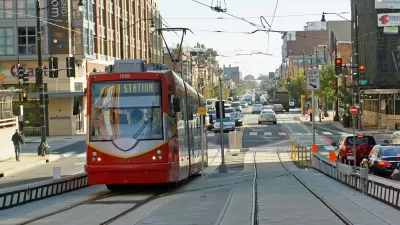A look back at Washington, D.C.'s most recent Comprehensive Plan reveals lessons for how the city should plan for the future next time it undertakes a comprehensive planning process.

The Greater Greater Washington site is undertaking a roundtable, of sorts, to review Washington, D.C.'s 2005 Comprehensive Plan. Each week, Greater Greater Washington readers are discussing the section and summarizing their discussion on the site.
David Whitehead summarizes the most recent discussion, which centered on the comp plan's priority on enabling an inclusive city.
DC's 2005 Comprehensive Plan began with a strong and encouraging vision: building a growing and inclusive city. Just one chapter later, it lists a set of contradictory guiding principles that waffle between preserving the status quo and promoting inclusive growth. Oops.
To back that argument, Whitehead digs into the plan's section on the guiding principles for growth. Readers notices that many of the guiding principles employ contradictory terms—antonyms even.
Corey Holman noticed that many of these statements use "near antonyms," like "Maintaining and enhancing the mix of housing types" (Principle #3) or "ensure that neighborhood character is preserved and enhanced" (Principle #8). He wrote, "How can something be maintained or preserved while also being enhanced? It's that wishy-washy language that allows people to see what they want in this document, instead of laying out a clear vision.
The lesson of the post is that next time around, the District will require a comp plan that makes strong statements about its principles—especially since the District is growing much faster than the 2005 plan anticipated.
FULL STORY: 33 pages after calling for a growing and inclusive city, DC's Comprehensive Plan muddies that vision

Alabama: Trump Terminates Settlements for Black Communities Harmed By Raw Sewage
Trump deemed the landmark civil rights agreement “illegal DEI and environmental justice policy.”

Study: Maui’s Plan to Convert Vacation Rentals to Long-Term Housing Could Cause Nearly $1 Billion Economic Loss
The plan would reduce visitor accommodation by 25% resulting in 1,900 jobs lost.

Planetizen Federal Action Tracker
A weekly monitor of how Trump’s orders and actions are impacting planners and planning in America.

Grand Rapids Mayor Proposes Garage Conversion Plan
The mayor says allowing homeowners to convert garages to dwelling units could alleviate the city’s housing shortage.

Baltimore Ordered to Improve Sidewalk Accessibility
The city is one of many to face lawsuits for failing to comply with the Americans with Disabilities Act.

This Toronto Suburb Has More Bus Riders Than Columbus, Ohio
Brampton, Ontario used gradual improvements in service to prove that if you build it, they will ride.
Urban Design for Planners 1: Software Tools
This six-course series explores essential urban design concepts using open source software and equips planners with the tools they need to participate fully in the urban design process.
Planning for Universal Design
Learn the tools for implementing Universal Design in planning regulations.
Smith Gee Studio
Alamo Area Metropolitan Planning Organization
City of Santa Clarita
Institute for Housing and Urban Development Studies (IHS)
City of Grandview
Harvard GSD Executive Education
Toledo-Lucas County Plan Commissions
Salt Lake City
NYU Wagner Graduate School of Public Service





























